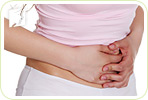After having run like clockwork for years and years, the periods you experience during menopause may be irregular. The major cause of irregular periods is an imbalance of the hormones estrogen and progesterone, but it may also be due to poor diet, stress, too much weight loss or gain, or any other medical condition. However, it's normal and a very common symptom of menopause. Not only can irregularity be irritating, but the accompanying symptoms of cramps, mood swings, and bloating can take both a physical and emotional toll.
Follow these diet tips for irregular periods to help regulate your cycle and cope with the symptoms.
Curb Your Carbs
Because abrupt changes in body weight can make periods irregular, it's important to maintain a consistent weight, or to lose or gain weight gradually and healthily. Consuming a low-carbohydrate diet can help with this. The best choice for the carbs you do consume is complex carbohydrates, such as wholegrain foods and brown rice. Low carb intake can also help with the symptoms of polycystic ovarian syndrome, of which menstrual irregularity is one.
Stay Away from Caffeine and Alcohol
Excessive consumption of caffeinated and alcoholic products is correlated to shorter menstrual cycles and heavy bleeding. Gradually reducing your consumption of coffee, tea, soda, chocolate, and spirits is one step toward regulating periods. It can even help reduce other symptoms of menopause, like hot flashes.
Drink Plenty of Water
Consuming enough water every day is generally a good practice to keep the body healthy and working efficiently, as well as to prevent the effects of dehydration. Water consumption can also help alleviate the cramps that often come with irregular periods.
Consider Dietary Supplements
In unusual cases, hormonal imbalance and irregular periods may be related to nutritional deficiencies. Ask your doctor if a vitamin supplement could help regulate your periods or ease other symptoms of menopause. A physician may recommend supplements like iron, vitamin D, calcium, or omega-3.
Irregular periods can be irritating, but after making a few basic lifestyle changes - by eating the proper foods and exercising - you will be better prepared to cope with their inconsistency, as well as the aches and pains that accompany them. You may even find that the cramps lessen or your periods become more regular. Click on the following link for more information on other methods for treating your irregular periods.
Sources
- Hahn, K.A. et al. (2013). Correlates of menstrual cycle characteristics among nulliparous Danish women. Clinical Epidemiology, 5, 311-319. doi: 10.2147/CLEP.S46712
- Mavropoulos, J.C. et al. (2005). The effects of a low-carbohydrate, ketogenic diet on the polycystic ovary syndrome: A pilot study. Nutrition & Metabolism, 2, 35. doi: 10.1186/1743-7075-2-35
- National Health Service UK. (2015). Irregular periods. Retrieved October 20, 2015, from http://www.nhs.uk/Conditions/Periods-irregular/Pages/Introduction.aspx




